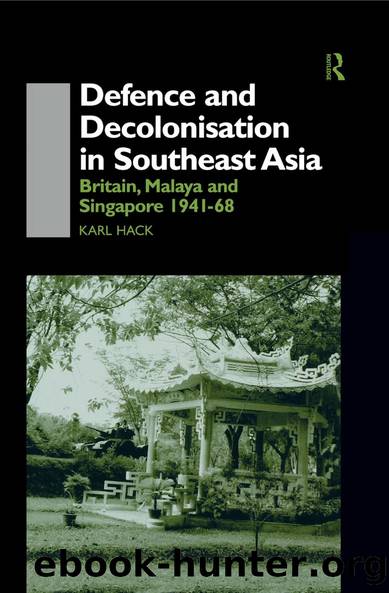Defence and Decolonisation in South-East Asia by Karl Hack

Author:Karl Hack [Hack, Karl]
Language: eng
Format: epub
Tags: Social Science, Ethnic Studies, General, Regional Studies
ISBN: 9781136839016
Google: pdZcAgAAQBAJ
Publisher: Routledge
Published: 2013-12-16T05:55:07+00:00
DIEN BIEN PHU AND THE LOSS OF TONKIN
In early 1954 British planners found themselves in the eye of a storm, awaiting the scheduled Geneva Conference on Korea and Indochina, and the results of the battle at Dien Bien Phu. It was clear by March that the French would offer real concessions in Geneva, in order to satisfy public desires to end seven years of âla sale guerreâ.1 The COS were also coming to accept that the tide was not going to swing back in Franceâs favour. Between the beginning of March and 1 April the Foreign Office responded by thrashing out a new âPolicy on Indochinaâ paper, with the endorsement of the COS and Eden. This recognised that France might be determined to reach a settlement at Geneva come what may. It suggested that the best agreement they could hope for include the partition of Vietnam, and the preservation an independent Cambodia and Laos.2
Even the irrepressibly optimistic MacDonald had by 18 March recognised that a choice between the evils of Viet Minh participation in a national government, or partition, might be unavoidable. It was feared that the only alternative, increased American involvement, might divert resources from Europe, could cause war with China, and possibly invoke the Sino-Soviet treaty. Dulles came to believe that this fear of tumbling into nuclear war exercised a morbid effect on British policy.3
In early April Lieutenant-General Charles Loewen, the Commander-in-Chief of Far East Land Forces, confirmed after visiting Indochina that the problem should be seen as primarily politico-military (like Malaya) rather than military-strategic. His report revealed Viet Minh infiltration was spreading in the South as well as the North. On the 10 April the COS reaffirmed that, even if the French held at Dien Bien Phu, they lacked the resources to maintain control throughout Indochina. Threats aimed at causing China to cease supplying the Viet Minh would be ineffective without including atomic war. Unless Britain was willing to risk tripping war with China and perhaps with the Soviet Union too, it would have to accept either communist participation in a coalition government or partition. The COS favoured partition, a coalition would result in communist domination of all Indochina.4
British policy now focused on the possibility of saving a non-communist barrier of countries to the south and west of Tonkin. So long as Cambodia, Laos and South Indochina could be secured, the Mekong River basin would be safeguarded and Thailand shielded from communism.5
Download
This site does not store any files on its server. We only index and link to content provided by other sites. Please contact the content providers to delete copyright contents if any and email us, we'll remove relevant links or contents immediately.
The Sympathizer by Viet Thanh Nguyen(4384)
The Rape of Nanking by Iris Chang(4201)
World without end by Ken Follett(3472)
Ants Among Elephants by Sujatha Gidla(3459)
Blood and Sand by Alex Von Tunzelmann(3193)
Japanese Design by Patricia J. Graham(3163)
The Queen of Nothing by Holly Black(2583)
City of Djinns: a year in Delhi by William Dalrymple(2546)
Foreign Devils on the Silk Road: The Search for the Lost Treasures of Central Asia by Peter Hopkirk(2454)
India's Ancient Past by R.S. Sharma(2450)
Inglorious Empire by Shashi Tharoor(2436)
Tokyo by Rob Goss(2427)
In Order to Live: A North Korean Girl's Journey to Freedom by Yeonmi Park(2377)
Tokyo Geek's Guide: Manga, Anime, Gaming, Cosplay, Toys, Idols & More - The Ultimate Guide to Japan's Otaku Culture by Simone Gianni(2360)
India's biggest cover-up by Dhar Anuj(2348)
The Great Game: On Secret Service in High Asia by Peter Hopkirk(2329)
Goodbye Madame Butterfly(2249)
Batik by Rudolf Smend(2179)
Living Silence in Burma by Christina Fink(2059)
